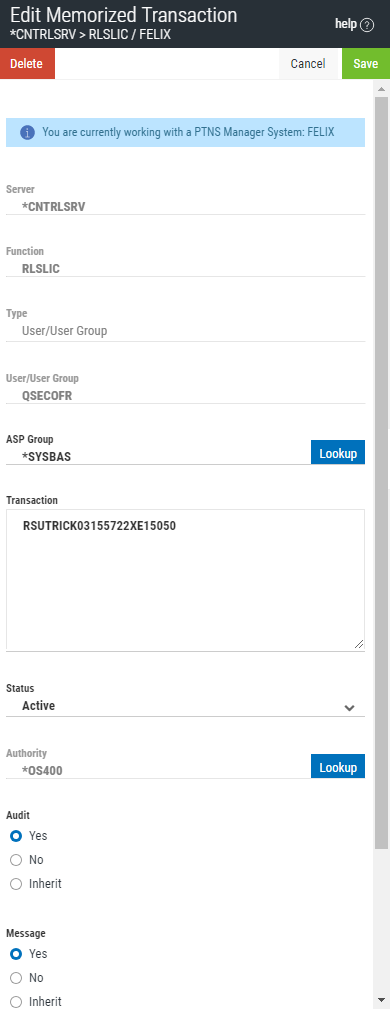
How to Get There
Click the Memorized Transactions tab on the navigation pane on the left side of the Exit Point Manager window. In the Memorized Transaction screen, click a memorized transaction.
What it Does
The Edit Memorized Transaction screen allows you to make changes to some of the attributes of a Memorized Transaction. Those attributes that are input capable can be changed.
Options
Save
Choose Save to save the Memorized Transaction and return to the Memorized Transactions screen.
Cancel
Choose Cancel to return to the Memorized Transactions screen without making changes.
Field Descriptions
Server
A Server in Exit Point Manager is a controlled entry point into your system. These entry points are determined and defined by IBM. Exit Point Manager has assigned easy-to-remember names to these controlled entry points. This field cannot be changed.
Function
A Function, or Server Function, in Exit Point Manager represents a class of operations that a given Server may perform. For example, the *SIGNON Server classifies its operations as those pertaining to changing passwords, generating authentication tokens, and retrieving sign-on information. Exit Point Manager has assigned easy-to-remember names to these Functions, such as CHGPWD, GENAUTTKN and RETRIEVE. This field cannot be changed.
Type
Specifies whether this is a User or Location rule.
User/Location
User represents the identity of the person initiating a transaction as a user profile. The special value *PUBLIC, when used on a rule, means that the rule applies to any User lacking a specific rule. When used as a subset or selection parameter, *PUBLIC means to select all such rules for display or printing. This displays the User to which this Memorized Transaction applies. If blank, then this is for a specific Location. If the value is *PUBLIC, the transaction applies to all users. This field cannot be changed.
Location represents the source of a transaction. Location can hold an IP Address, an IP Address Group or the name of an SNA Communications Device. The special value *ALL, when used on a rule, means that the rule applies to any rule means that the rule applies to any Location lacking a specific rule. when used as a subset or selection parameter, *ALL generally means to select all such rules for display or printing. This displays the Location to which this Memorized Transaction applies. If blank, then this is for a specific User. If the value is *ALL, the transaction applies to all locations. This field cannot be changed.
ASP Group; Lookup
This is the name of an ASP Group. It is used in rule evaluation to determine if an object referenced in a transaction is the one specified on the object entries for this list.
Click Lookup to open the Select ASP Group screen where you can choose from the following ASP Groups:
*SYSBAS The Object List entries refer to those objects in *SYSBAS.
*ALL The Object List entries refer to those objects in any namespace.
Transaction
The Memorized Transaction against which incoming transactions are tested. If a match is found, then this rule will be invoked. Undisplayable characters in the transaction data are replaced by the mid—dot character (-).
You can use the Transaction wildcard character (%) to make a Transaction generic. The wildcard character is valid only at the end of a Transaction string. When you are memorizing or changing a Memorized Transaction, the first occurrence of the wildcard character that was NOT present in the string before you changed it will make the string generic and all data after that wildcard character will be discarded.
Status
This is the status of the Memorized Transaction.
If this box is checked, the memorized transaction is "Active," and Exit Point Manager will attempt to match this transaction during rule enforcement. Memorized Transactions that are changed to *ACTIVE will have a matching User or Location rule changed to the corresponding action; *ALLOW to *MEMOS400, *REJECT to *MEMREJECT, or *SWITCH to *MEMSWITCH.
If this box is not checked, the memorized transaction is "Inactive," and Exit Point Manager will not attempt to match this transaction during rule enforcement. Memorized Transactions that are changed to *INACTIVE will have the matching User or Location rule changed (if there are no other Memorized Transactions for that rule) to the corresponding action; *MEMOS400 to *ALLOW, *MEMREJECT to *REJECT, or *MEMSWITCH to *SWITCH.
Authority
Authority represents the action to be taken when a rule is found that matches the data present on a transaction.
Choose Lookup to specify the new Authority value for the rule. The list of valid values may include one or more of these values:
*OS400 Exit Point Manager will use normal operating system authority for the user.
*REJECT Exit Point Manager will reject requests.
*SWITCH Exit Point Manager will use the authority of the switch profile for the transaction. A switch profile entry is required.
Audit
The Audit transactions flag controls the logging of transactions to the Log Journal set up on the work with Exit Point Manager System Values panel. Specify one of these values for Audit transactions:
Message
The Send messages flag controls the sending of messages to the Log Message Queue set up on the work with Exit Point Manager System Values panel.
Specify one of these values for Send messages:
Capture
The Capture transactions flag controls whether transactions are remembered in Exit Point Manager for later memorization. Once captured, transactions can become Memorized Transactions which can act as rules. Specify one of these values for Captured transactions:
Select which systems to save to
All managed systems are listed here. Check the systems you would like to save the memorized transaction to. Or, check Select All to copy the memorized transaction to all managed systems.